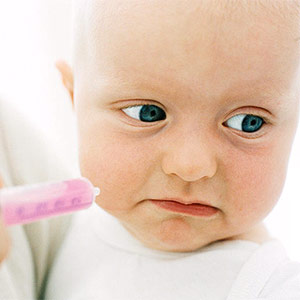The average cold can last up to 10 days -- that's a long time of not feeling well for a baby! Here's how to survive and make the little one feel better, too.
Keep Them Hydrated
Treat a Fever
Use a "Nose Hose"
Even adults have a hard time sleeping with a stuffy nose -- now imagine you're a baby who can't even blow your nose for relief! Dr. Sears recommends using a nasal aspirator and saline nasal spray before your baby eats and goes to sleep to clear the nose and to loosen the drainage in the back of the throat. "Babies under 1 typically don't breathe through their mouths very well, so when the nose is clogged, it is truly uncomfortable for them," Dr. Sears.
Run a Humidifier
A cool mist humidifier in your baby's room during nap time and at night can help with the cough by moistening the dry winter air, says Dr. Strifling. Adding a one or two drops of menthol, eucalyptus, or pine oil to a vaporizer might also help your baby feel less congested (you can get these oils at any health-food store). Also, be sure not to have the heat turned up too high, which can worsen Baby's congestion. Instead, keep your home at a comfortable 72-74 degrees in the winter months.
Create a Steam Room
You can help ease your child's congestion by running the hot water in the shower and sitting in the bathroom for about 15 minutes while the steam fills the room, says Dr. Sears. The heat from the steam loosens up the mucus in Baby's nose and chest and relieves the stuffiness.
Skip OTC Treatments
Most over-the-counter cough and cold medicines (aside from acetaminophen and ibuprofen) are not recommended for children under the age of 6 according to the AAP. "Usually antibiotics are not needed, unless the congestion develops into an ear infection or pneumonia," says Dr. Strifling. "If your baby has fever for more than three or four days, or you feel like his symptoms are getting worse rather than better, than it might be time to visit your pediatrician."Elevate the Head
Sleeping at a slight incline might help relieve your baby's postnasal drip. You can do this by placing a couple of towels between the head of the mattress. Never use pillows to prop up your baby since they're suffocation hazards, and don't prop up the whole crib or bassinet since it can tip over. If elevating the mattress makes you nervous, you can always let the baby sleep in his car seat in a semi-upright position
Elevate the Head
Sleeping at a slight incline might help relieve your baby's postnasal drip. You can do this by placing a couple of towels between the head of the mattress. Never use pillows to prop up your baby since they're suffocation hazards, and don't prop up the whole crib or bassinet since it can tip over. If elevating the mattress makes you nervous, you can always let the baby sleep in his car seat in a semi-upright position.
Wash Your Hands
According to the Centers for Disease Control (CDC), 80 percent of all infectious diseases are transmitted through the hands. "It's crucial that anyone handling the baby keeps their hands clean," Dr. Sears says. "And also remember to clean children's hands with baby wipes -- especially once they start putting everything in their mouths." Also be sure your baby's hands are completely dry to ensure the alcohol from the wipe is not ingested.
Recognizing the Symptoms




















